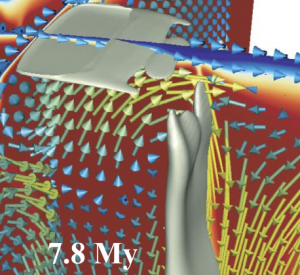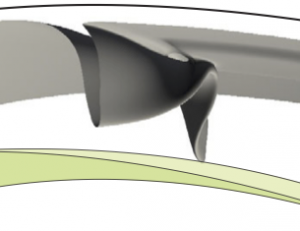Learning and teaching are part of the scientific adventure. We learn when we are curious and excited to know more. We teach to share that excitement and a new way of thinking about the world we live in. Prof. Billen engages in education through:
- Teaching Undergraduate and Graduate Courses
- Mentoring Undergraduate and Graduate Students in Research
- Development of Teaching Tools
Learning continues for all of us, no matter what stage of our careers or how old we are. Here are links to some excellent resources videos on writing and speaking, two things that I continue to learn about and work to improve everyday.
- The Craft of Writing Effectively by Larry McEnerney (you-tube video)
- How to Speak by Patrick Wilson (MIT) (you-tube video)
Teaching Undergraduate and Graduate Courses
 I usually teach two undergraduate and one graduate course each year.
I usually teach two undergraduate and one graduate course each year.
Current courses are:
- GEL 50: Introduction to Physical Geology (last taught Winter, 2020)
- GEL 56: Introduction to Geophysics (last taught Spring, 2020
- GEL161: Geophysical Field Methods (last taught Spring, 2019)
- GEL 219: Fracture and Flow of Rocks (last taught Fall, 2019)
- GEL 217: Topics in Geophysics (last taught Winter, 2015)
I have also taught these other courses in the past:
- GEL 17: Earthquakes and other Hazards
- GEL 101: Earth Dynamics II: Structural Geology
- GEL 150B: Geological Oceanography
- GEL 390: Teaching and Writing in Geology
Mentoring Undergraduate and Graduate Students in Research
 Learning to do scientific research occurs by doing research with guidance (and then re-doing it because its usually not quite right the first time). Our group usually has 1 to 3 graduate students and 1 to 2 undergraduate students. We try to pair up undergraduate students with graduate student projects. This provides more mentoring for the undergraduate student and an opportunity for the graduate student to learn how to teach and mentor while getting useful data or model results for their own research.
Learning to do scientific research occurs by doing research with guidance (and then re-doing it because its usually not quite right the first time). Our group usually has 1 to 3 graduate students and 1 to 2 undergraduate students. We try to pair up undergraduate students with graduate student projects. This provides more mentoring for the undergraduate student and an opportunity for the graduate student to learn how to teach and mentor while getting useful data or model results for their own research.
Potential graduate students should contact Dr. Billen by e-mail to determine if there are openings for new graduate students in the group. Please include a description of any research experience, your coursework or other knowledge-building experiences, specific research interests, and degree goals. Due to the nature of the research topics and tools used in our research potential graduate students should have a strong mathematics (including linear algebra and differential equations) and geophysics (or physics, fluid dynamics or continuum mechanics) background, with some experience in computer programming (e.g., matlab, python,…), and a strong interest in building on these skills extensively.
Undergraduate students interested in doing research for credit in their sophomore (GEL 99) or junior (GEL 199) years or a senior thesis (GEL 194) should contact Dr. Billen by e-mail to arrange a time to talk. Please include information about your year, your coursework (geology, geophysics, mathematics, physics, computer programming), and any specific research interests)
Development of Teaching Tools
 With funding from a National Science Foundation (NSF) Career award and careful work by an undergraduate research assistant (Jessie Saunders) we developed tools for teaching students how to think about and envision complex 3D geologic structures. There are movies for demonstrations or homework assignments. Data sets can be used with interactive 3D visualization software for labs or more in depth learning activities. These tools and data sets are available from the 3D Geologic Structures Visualization Education Project.
With funding from a National Science Foundation (NSF) Career award and careful work by an undergraduate research assistant (Jessie Saunders) we developed tools for teaching students how to think about and envision complex 3D geologic structures. There are movies for demonstrations or homework assignments. Data sets can be used with interactive 3D visualization software for labs or more in depth learning activities. These tools and data sets are available from the 3D Geologic Structures Visualization Education Project.
